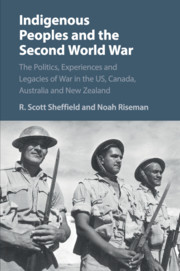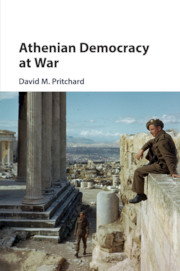Refine search
Actions for selected content:
15418 results in Military history
Chapter 3 - Naval Matters in Old Comedy
-
- Book:
- Athenian Democracy at War
- Published online:
- 08 November 2018
- Print publication:
- 29 November 2018, pp 109-137
-
- Chapter
- Export citation
Copyright page
-
- Book:
- Athenian Democracy at War
- Published online:
- 08 November 2018
- Print publication:
- 29 November 2018, pp iv-iv
-
- Chapter
- Export citation
Chapter 7 - Sport and War
-
- Book:
- Athenian Democracy at War
- Published online:
- 08 November 2018
- Print publication:
- 29 November 2018, pp 180-205
-
- Chapter
- Export citation
General Index
-
- Book:
- Athenian Democracy at War
- Published online:
- 08 November 2018
- Print publication:
- 29 November 2018, pp 257-266
-
- Chapter
- Export citation
Tables
-
- Book:
- Athenian Democracy at War
- Published online:
- 08 November 2018
- Print publication:
- 29 November 2018, pp x-x
-
- Chapter
- Export citation
Figures
-
- Book:
- Athenian Democracy at War
- Published online:
- 08 November 2018
- Print publication:
- 29 November 2018, pp vii-ix
-
- Chapter
- Export citation
Chapter 2 - The Armed Forces
-
- Book:
- Athenian Democracy at War
- Published online:
- 08 November 2018
- Print publication:
- 29 November 2018, pp 28-108
-
- Chapter
- Export citation
Index of Sources
-
- Book:
- Athenian Democracy at War
- Published online:
- 08 November 2018
- Print publication:
- 29 November 2018, pp 267-288
-
- Chapter
- Export citation
Foreword
-
- Book:
- Athenian Democracy at War
- Published online:
- 08 November 2018
- Print publication:
- 29 November 2018, pp xi-xiv
-
- Chapter
- Export citation
Contents
-
- Book:
- Athenian Democracy at War
- Published online:
- 08 November 2018
- Print publication:
- 29 November 2018, pp v-vi
-
- Chapter
- Export citation
Glossary of Greek Terms
-
- Book:
- Athenian Democracy at War
- Published online:
- 08 November 2018
- Print publication:
- 29 November 2018, pp 219-228
-
- Chapter
- Export citation
Chapter 8 - War and Panhellenic Sporting Victory
-
- Book:
- Athenian Democracy at War
- Published online:
- 08 November 2018
- Print publication:
- 29 November 2018, pp 206-218
-
- Chapter
- Export citation

Indigenous Peoples and the Second World War
- The Politics, Experiences and Legacies of War in the US, Canada, Australia and New Zealand
-
- Published online:
- 26 November 2018
- Print publication:
- 06 December 2018

Athenian Democracy at War
-
- Published online:
- 08 November 2018
- Print publication:
- 29 November 2018
Introduction
-
- Book:
- Painting War
- Published online:
- 28 December 2018
- Print publication:
- 01 November 2018, pp 1-15
-
- Chapter
- Export citation
Contents
-
- Book:
- Painting War
- Published online:
- 28 December 2018
- Print publication:
- 01 November 2018, pp vii-vii
-
- Chapter
- Export citation
Chapter 1 - A record for posterity, 1916–17
-
- Book:
- Painting War
- Published online:
- 28 December 2018
- Print publication:
- 01 November 2018, pp 16-48
-
- Chapter
- Export citation
Bibliography
-
- Book:
- Painting War
- Published online:
- 28 December 2018
- Print publication:
- 01 November 2018, pp 247-258
-
- Chapter
- Export citation
Abbreviations
-
- Book:
- Painting War
- Published online:
- 28 December 2018
- Print publication:
- 01 November 2018, pp xvii-xviii
-
- Chapter
- Export citation
Index
-
- Book:
- Painting War
- Published online:
- 28 December 2018
- Print publication:
- 01 November 2018, pp 259-268
-
- Chapter
- Export citation
